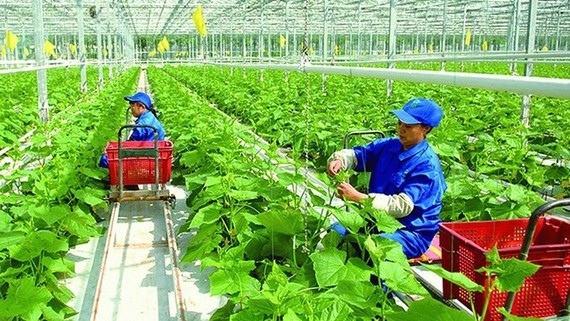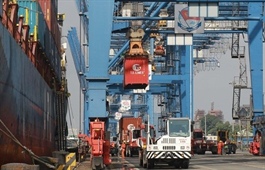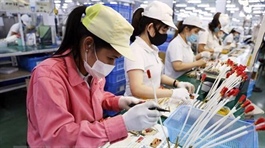FDI projects must not disadvantage farmers
FDI projects must not disadvantage farmers
The Government has agreed to the proposal sent by the Ministry of Planning and Investment on the development criteria to attract Foreign Direct Investments (FDI) into the country.
Illustrative photo. |
For such investments, relevant ministries, provinces, and cities must be assigned the tasks to study, develop processes, and implement higher standards. The criteria to select incentives also needs to be fair for domestic enterprises, especially for farmers and people living in rural areas.
FDI sector
According to the General Statistics Office, the contribution of the FDI sector to GDP increased from 15.2% in 2010 to 20.1% in 2020. Therefore, in ten years, the contribution of the FDI sector to GDP increased by nearly 5%. In this 5% increase in the FDI sector, 2% decreased in the state sector, from 29.3% in 2010 to 27.3 in 2020, and 3% in the economic sector, from 32% in 2010 to about 29% in 2020. So what do we expect from Foreign Direct Investment, as the attraction of capital flow, technology transfer, management methodology, and labor attraction, from FDI enterprises have not really lived up to expectations over the last twenty years.
FDI enterprises do business effectively due to modern management methods, but also due to incentives in tax policies, access to capital, and land. It is worrisome to learn that the more efficient this sector is, the more money flows to pay owners abroad legally, leading to smaller national savings and an increase in debts.
As per the report on developing criteria for attracting Foreign Direct Investment, which was sent by the Ministry of Planning and Investment, it shows that the ministry recognizes most of the problems concerning this sector. However, the draft also mentions the effectiveness of this sector. The question now arises as to what does Vietnam gain from the FDI sector. Another issue to note is that there should be an equal treatment policy among different types of ownerships. In the last twenty years, the economic components that account for the largest proportion of GDP is the individual economy, which does not seem to have received much attention.
Therefore, the Ministry of Finance also needs to step in to build a select FDI criteria, otherwise, no matter how good the agenda, it will not be meaningful. For instance, FDI enterprises basically do outsourcing for exports, and in 2021 exports in the FDI sector accounted for nearly 74% of the total export turnover of goods. According to calculations from the inter-industry balance sheet, the export of goods had the lowest spill over to the value-added to the economy.
In this, agriculture, forestry and fishery sectors with good spill over indicators to the economy are always said to be a priority, but policies, especially tax policies do not seem to aim for this, because the efficiency protection of the agricultural sector has been decreasing over the years. If in 2012 the effective protection rate of the agricultural sector was about 0.27, by 2019 it was a negative 0.08. This means that this industry group is completely unprotected in terms of production.
Rural sector disadvantaged
According to Decree 57/2018/ND-CP of the Government, enterprises investing in agriculture and rural areas will enjoy many incentive mechanisms and policies of the State, such as incentives and support via exemptions; reduced land use fees; exemption or reduction of land and water rents; support of land concentration; credit access and support; support research, transfer, and application of hi-tech agriculture; support human resource training; market development; grassroots investment support; providing public service; and investing in agricultural and rural infrastructure.
A very basic issue that experts have mentioned for many years is that tax policies for industries that produce products that are inputs for agriculture, such as fertilizers, are not subject to Value Added Tax (VAT), and fertilizer production enterprises are not entitled to tax deductions for input materials. This policy of the Ministry of Finance looks preferential on the surface, but in fact, there are inadequacies between domestic enterprises and FDI enterprises. This is to say, when the cost and selling price of fertilizer increases, farmers receive enough, while the real incentive for FDI enterprises is when they pay the VAT rate of 0% for export goods. This means that FDI enterprises not only do not have to pay VAT but also receive input VAT deduction.
The policy of the Ministry of Finance not only causes difficulties for enterprises producing products as input for the agricultural sector, but also causes difficulties for farmers and increases the production cost of agricultural products. When costs increase, it will make farmers lose on profits, leading to an increase in consumer prices, and it becomes increasingly difficult for input products for agriculture and agricultural products to compete with imported goods. This is the case when the import tax on many products is 0%.
This makes production protection of agricultural groups negative, which means that this group is not only unprotected, but also suffers from the tax policy of the Ministry of Finance. In other words, the group of agricultural product manufacturing industries is not encouraged by the State, which seems to contradict Decree 57 on incentives for agriculture and rural areas.
Recently, the Ministry of Finance finalized the draft resolution of the National Assembly on VAT policy, which was to support and develop fertilizer production enterprises. The Ministry proposed to include 5% VAT tax from now on. Although this is a step forward, it is not enough to be called an incentive for agriculture. Moreover, what is beneficial to the people and the economy has often done very well, while these shortcomings are not mentioned in the Ministry of Planning and Investment report.























